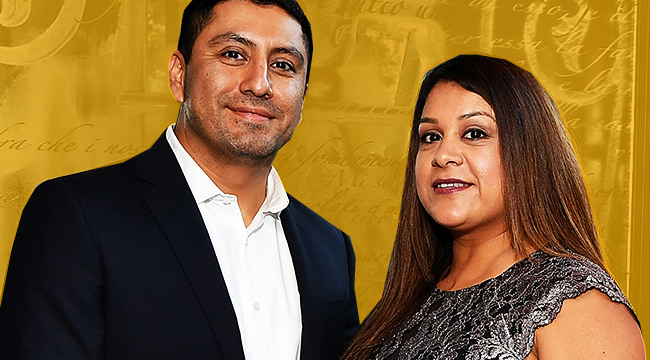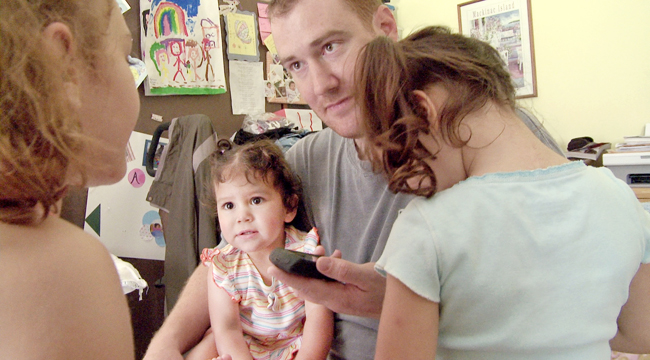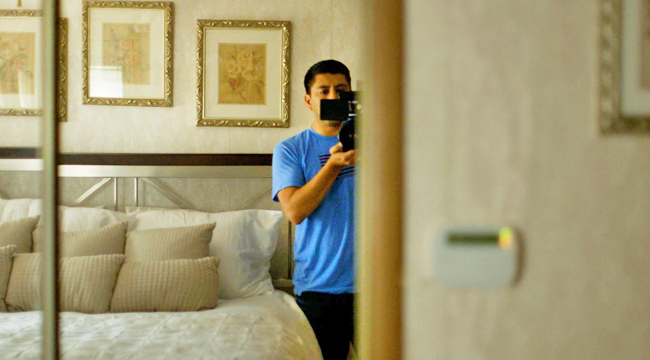
HBO original documentary The Sentence may make you break down in tears, but you’ll be thankful for the experience. The film, directed by Rudy Valdez, offers an intimate and scathing look at mandatory minimum prison sentencing laws and their devastating effects upon not only those who serve time but those who love them. The project is sourced from hundreds of hours of footage, captured over the course of a decade, that follow Valdez’s sister, Cindy Shank, and her family, including three young daughters whose mother was whisked away, years after her tangential involvement in the drug-related crimes of an ex-boyfriend. Cindy was granted clemency during the final months of the Obama administration. Yet the sobering fact remains that she was one of only 1,600 people who found relief through the clemency program, although an astounding 36,000 qualified, which shows that the battle isn’t even close to finished.
The Sentence took home an Audience Award at this year’s Sundance Film Festival and will make its HBO debut on Monday, October 15. Valdez and Shank were gracious enough to speak with us at length about the filmmaking process and the “girlfriend problem,” which could impact an untold number of similarly situated families in the future, given that Attorney General Jeff Sessions quickly reversed the Obama policy that urged federal prosecutors to consider less severe sentences for nonviolent drug offenders in certain cases. Both director and subject were very frank with us about the more serious aspects of this project, but they also got real about a source of bittersweet humor throughout the film (Cindy’s longing for their dad’s fajitas).
The “girlfriend problem” really highlights how the war on drugs has made casualties of those women who get charged with conspiracy but don’t have enough meaningful information of crimes to avoid mandatory sentences. To what degree this is happening today?
Valdez: The conspiracy laws are still very much in effect, so I don’t have the exact stats, but I think Cindy can talk to the fact that while she was incarcerated, she met many, many people who were there for very similar circumstances to her. You know, this whole notion of living in a house or being knowledgeable of a crime and not going to the police for whatever reason makes you just as guilty … and guilt is one thing, but the sentencing is another. And I think that sentencing somebody on the same level as someone who actually committed the crimes is a real problem here.
Shank: I did manage to forge some very good friendships [in prison] — a lot of women who had stories exactly like mine, and who were going through the same exact thing. I saw how huge this problem was. It’s sad to me, when I got clemency, I was just beside myself, thankful and with joy. But there was a very big part of me that was sad to leave all of these women behind, and “Why me?” I struggled with that because they’re so many people who deserve to be home with their children. It’s a struggle for me, but that’s why I continue to do this, why I’m talking with you now. Because there’s so much more work to do.
Rudy, you filmed the hundreds of hours of footage partially so that Cindy could see those milestones that she missed while the girls were growing up. At what point in the process did you decide to make this into a full-on documentary?
Valdez: It’s amazing, I would say that it’s really unfortunate that it happened with this film, but I can actually pinpoint the moment when I became a filmmaker, and this became a film. The opening scene of this film when I fly back to Michigan to film Autumn’s dance recital, a recital that Cindy wanted to go to so badly, and I was just there wanting to capture it, so she could watch it one day. Cindy called, completely unexpectedly, and I just keep filming. And she says that line to Autumn: “Do you know what Mommy’s gonna do when you go to dance? I’m gonna lay down in my bed, and I’m gonna close my eyes, and I’m gonna think about you.” And it all struck me right then. At that point, I had been doing a lot of research on Cindy’s case, and her sentence and what it meant, and not only was I finding out that my sister’s case not a mistake, but that thousands and thousands of other people are also facing very similar crimes. At that moment, I realized that it’s more than just those people who are being incarcerated, it’s their children who are doing their sentence as well. I had to tell the story at that moment, and it just became a documentary.

Cindy, how hard was it for you to remain so positive with the girls during phone calls and visits?
Shank: It wasn’t hard to stay upbeat. I lived for those calls, and I never wanted to interrupt the girls doing things, and I always wanted to utilize every moment. When I had them on the line, it was just me reaching as far as I could to them, you know I wanted to be happy for them, I wanted to be Mom, to listen, I had questions, they had questions. Sometimes we cried, but I never wanted to be a burden more than what was already happening. It was already so hard, I wasn’t gonna call with doom and gloom, I did anything just to make them happy.
Neither of you shy away from being vulnerable on camera during various moments. There’s zero filter, which is part of why this story translates well onscreen. Rudy, why did you allow Cindy’s eldest daughter and your sisters to turn the camera on you as well?
Valdez: Part of that is because I was asking so much of my family members, and during the course of all this, I was working on other documentary projects, and understanding what it meant actually earn the trust of people who were allowing me to tell their stories. With my family, it was sort of ingrained that I have this trust from them already. And throughout all of the other projects that I worked on, I was starting to understand what that trust and openness and honesty in front of the camera actually meant. And I felt that it would have been extremely hypocritical of me — as someone who does this as work and a passion — to have somebody who trusts me and say that I’m not willing to go on camera. I should be willing to do that as well if I’m asking other people to do that, so anytime the girls would say, “I wanna interview you,” of course I’m gonna let them interview me.
And in that scene when my other sister, Nina, grabs the camera and turns it completely on me. I could have not let the camera go, I could have said, “My spot is behind the camera,” but it would have been unfair for me to not let [people see] this emotional breakthrough that I was having at that point. That was a culmination of nearly a decade of work and passion and love and fight, all coming to a head right there. That was one of the first times I cried throughout this entire process. I’m somebody, as you can tell, likes to talk! I have the gift of gab, and I couldn’t even say anything.
One moment that affected me was that scene Rudy just mentioned — when the family’s gathered around the phone after Cindy hears about the clemency, and Rudy’s crying, and the camera goes out of focus. It was striking, and I couldn’t tell whether that blurring was intentional or an accident that you decided to leave in the film?
Valdez: It was very much an accident. One of the things that I do in the film, the way I shoot this film to make it very intimate is to shoot on a prime lens through most of it, and I shoot with the prime lens completely wide open, which means that it has a really shallow depth of field because I’m always very intentional with where my focal point is when I’m shooting. So my sister Nina just grabs the camera and points it at me, and she doesn’t know what any of that means. It’s difficult to do that, to focus that, and so it was an accident, but I think it’s also emblematic of a lot of things — of the filmmaking, of the storytelling, of the process, of the happy accidents, of the fact that it’s content over everything. It’s story over everything. You don’t have to have a beautifully composed frame, you don’t have to have the best camera, you don’t have to have all these beautiful things all the time when you have beautiful content.

This feels like an overly intimate question to ask as well, but please tell us about that scene outside the prison when Cindy was released.
Valdez: I’m actually very glad you asked that question because I don’t think anyone has asked me to break down that scene for them at all. But it’s very emblematic because in the very beginning of the film, you see Autumn, you see [their father] Adam and the girls and my mom going to see Cindy for the first time, and the camera is sort of peeking over the edge of the car because I was terrified. I didn’t know if I was gonna get arrested for filming, but I was trying to capture a little moment. And then here, we see Cindy dragging her belongings out of the prison, you know, fast-forwarding 9 1/2 years. We see my brother waiting, crying, and he doesn’t know what he’s going to do at that moment. It was completely organic … and he just runs, and he couldn’t hold himself any longer. And you see me sort-of flip the camera to the side, and pause for the second. I’m doing the math like, “If I go out there and film and get arrested, what’s going to happen to me?” Very quickly, I say, “Whatever it is, it’s worth it.” And I run out to my brother, and they’re embracing each other, and the first thing you hear is Cindy saying, “I’m okay, brother. I’m okay.” After spending that much time in prison, her first thing that she did is comfort us on the outside. That’s emblematic of who she is and what a strong person she is. And how every single person in this family was hanging on by a thread, trying to hold it all together, and we couldn’t hold it together anymore.
As hard-hitting as this documentary is, let’s try and touch on something slightly more lighthearted. Cindy, how wonderful were your dad’s fajitas after you finally left prison?
[Laughter from both Shank and Valdez.]
Shank: Amaaaazing. I love my dad’s fajitas, are you kidding me? I grew up on them, I dreamed about them when I was away. I would talk to him, and I think he felt bad sometimes because I’d be like, “So, you gonna make fajitas when I get out?” And he’d say, “I’m doing fine, thank you.” I love my dad, and we’re so close. Even now, [those fajitas] are our whole point of getting together, they’re amazing. It’s a secret recipe.
Valdez: Maybe you could put in your piece … the fact that, as much trust and honesty and vulnerability and love there is in our family, my father will not give me his fajita recipe. I’m asking him to give it to me, now.
We can make a request, but he may not listen!
Valdez: Please make a request.
HBO’s ‘The Sentence’ debuts on Monday, October 15 at 8 pm EST. This interview has been edited and condensed for clarity and length.






